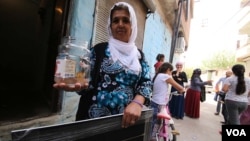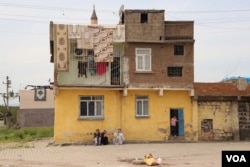Before afternoon prayers, the mosque's speakers barked the dreaded order that residents of Sur's Ali Pasa neighborhood had hoped would not come so soon.
“The neighborhood must be vacated at the latest on Monday evening, May 1."
After clashes between Turkish security forces and the PKK's youth branch devastated Sur district in 2015 and 2016, the government decided an urban transformation project was best for many neighborhoods.
The decision was implemented right away in areas where the clashes were intense, with nearly 2,000 buildings demolished in six neighborhoods. Because the houses already were vacated, people were not allowed to go back, and new houses were built as the damaged ones were razed.
Homes are condemned
The Ali Pasa and Lalabey neighborhoods, which are home to 7,000 people and were the least affected, got the word Thursday that they were next. Residents were forced to vacate temporarily last year, but this time they were asked to leave for good. Many of the houses were condemned. The government paid homeowners the value of their homes. Tenants got nothing.
“We don't want to leave but we have to,” said Baris Umut, who was among those who waited until Monday to leave. “My uncle used to live across the street. Now it is an empty lot. In the morning while we are having breakfast, they came with machines and demolished the house.”
Added Seniha Yildiz: “It is as if we are marching to our death. We are used to here, we were happy with our life.”
Sur's history dates back to the 7,500s BC., and it is one of the first places where humanity started settled life. Now its people are on the move.
Has happened before
For Yildiz Kardas, who lives with her three sons and their families in two adjacent houses, it's not her first forced migration.
An order to vacate was given to her village in Mardin 26 years ago, and the family moved to Diyarbakir. Even though she and her family had to move to another district in Diyarbakir last year due to the clashes, they returned to their house once the operations were over.
“We cried till morning” the night after the latest vacate order came, she said. “I don't know what I will do. We can only pay rent for a couple of months.”
Several residents bemoaned that the government compensation isn't enough to buy another house, but that they had no other options but to comply with the government order.
“I don't have that kind of money,” resident Veysi Cakar said. “My only income is salary from the government for my disability, and I can't even make ends meet with that. I will leave, what else I can do? Am I going to fight with security forces?”
This report was produced in collaboration with VOA's Turkish Service.





